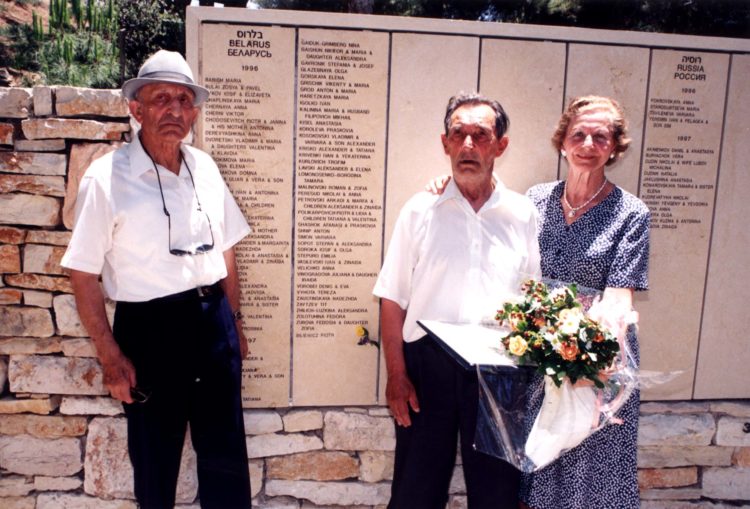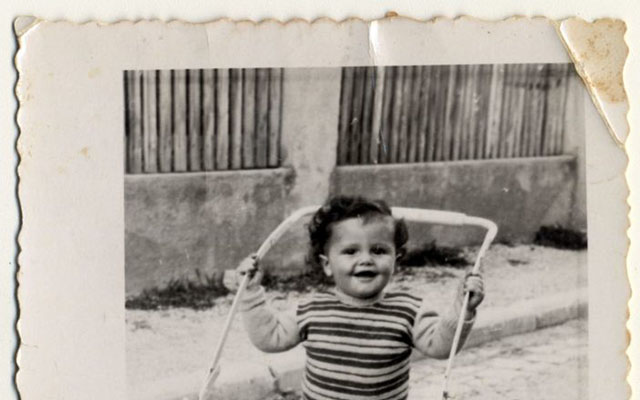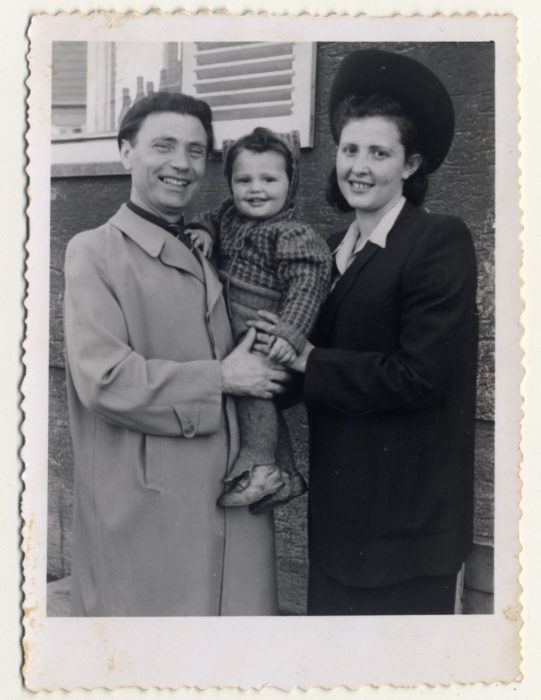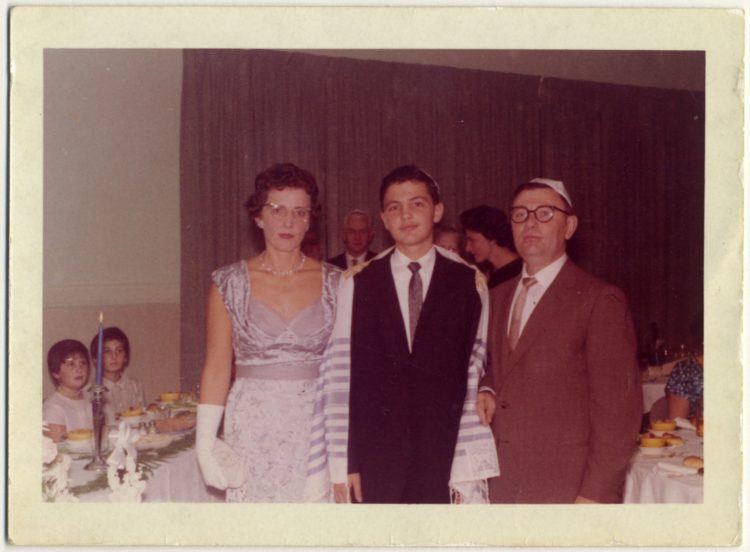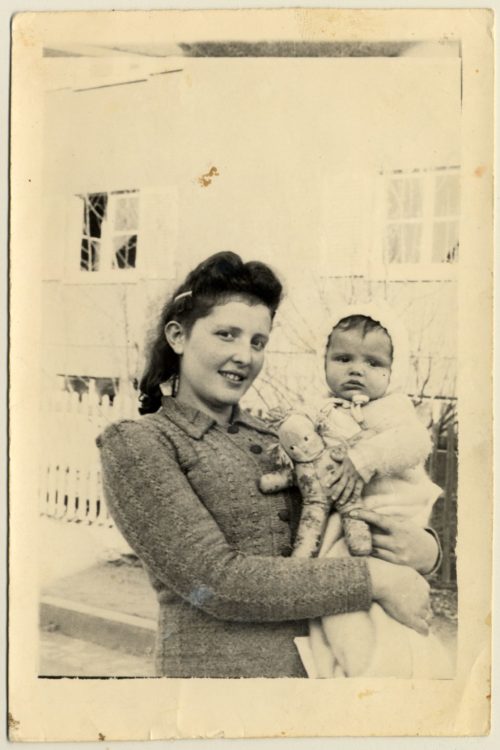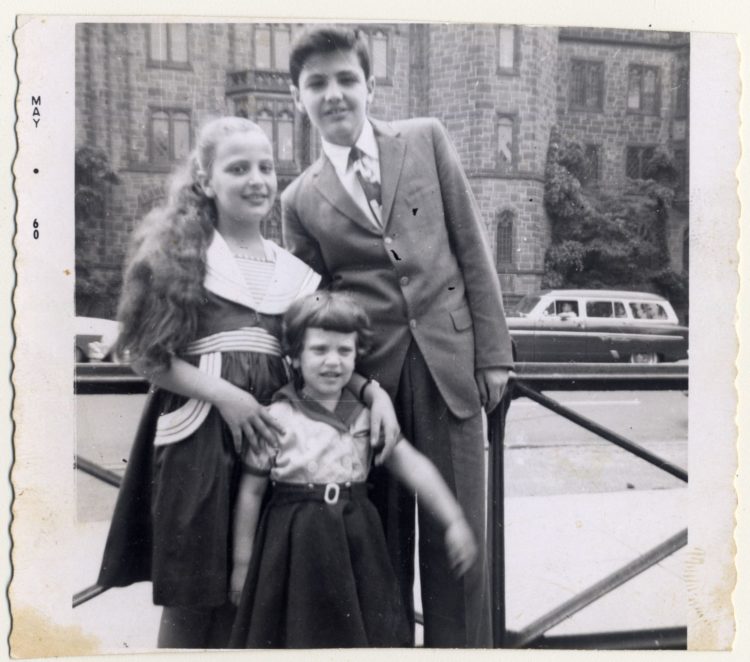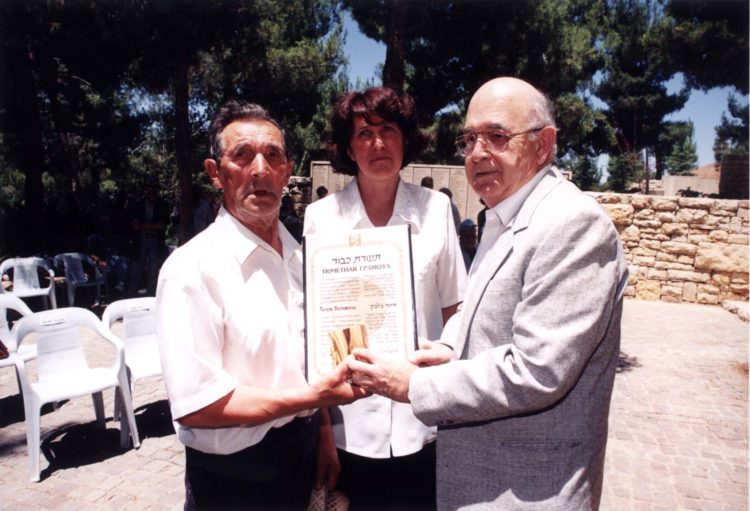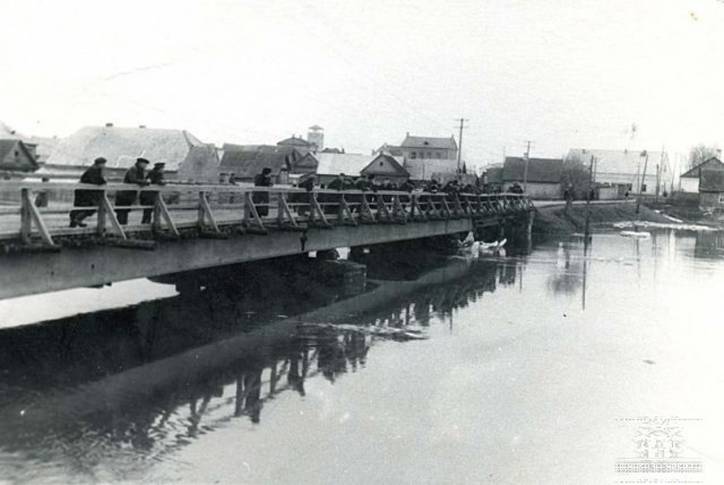Eleanor Reissa: You’re listening to “Those Who Were There: Voices from the Holocaust,” a podcast that draws on recorded interviews from Yale University’s Fortunoff Video Archive for Holocaust Testimonies. I’m Eleanor Reissa.
If you’ve listened to our two previous episodes, you already know that Celia Kassow was a teenager in Poland at the start of World War II. And that after she escaped from the Jewish ghetto, she was hidden under the floor of a barn for more than a year, then fled to the woods where she joined the Soviet partisans. The man who hid her was a young Polish farmer.
If you haven’t yet heard Celia’s testimony, you’ll want to go back and listen before continuing with this episode. That’s because in this final episode of our first season you’ll meet Sam Kassow, Celia’s son. Sam was born on October 3, 1945, in Stuttgart, Germany, where his parents were living in a displaced persons camp.
Sam Kassow is a history professor at Trinity College in Hartford, Connecticut, and is an advisor to this podcast. He’s an expert in the history of Ashkenazi Jewry. We wanted to hear Sam’s thoughts on his mother’s experiences during the war. So we invited Sam into a studio at Yale University to talk with our co-producers Nahanni Rous and Eric Marcus.
It’s now September 12, 2019, and Sam has taken a seat in front of the microphone across from Eric and Nahanni. Sam is a big man with a gentle manner. He has a round, open face and a head of thick gray hair. Nahanni and Eric ask Sam to reflect on his mother’s life. They have no idea that this will lead to a breathtaking story about his trip back to the village where his mother once lived.
———
Sam Kassow: I think, by her lights, I think one of her dreams was to be normal. Uh, I think maybe the brass ring was, uh, Ozzie and Harriet, you know, the, you know, the colonial mom and dad, the dog, Muffy and Buffy. That was probably the brass ring. She watched a lot of television. Uh, and there was this vision of, of normal, of, of a normal life. Uh, I think, by her standards, she achieved, I think, some kind of peace.
Nahanni Rous: Can you share with us your earliest memory?
SK: I don’t know if they’re memories, uh, or if they’re dreams or if they’re reflections of what people told me. Uh, I think I remember being in a German hospital, uh, looking down from the window and watching people walking on the street.
I think I have very vague memories of a big, big church, which, uh, may have been the Ulm Cathedral, which was nearby to our DP camp. I think I remember that. The memories I definitely have are of the ship coming to the United States. That I remember. I remember vaguely coming into New York. Uh, the Carnation milk. That was a big deal. I remember the peanut butter and jelly sandwiches on the ship—like, okay, this country has food. This is gonna be great. Uh, so that’s what I remember, but I don’t remember much of Germany itself.
NR: Do you have early memories of life once you got to America?
SK: Yes. Uh, we settled in New Haven, Connecticut. My mother wanted to go to Israel, but my father had, uh, three uncles who all lived in New Haven, they all had little grocery stores. And so they sponsored us. And so we settled in Fairhaven on Walcott street, near James and Grand. And, uh, both my parents worked for a while. I was with the lady upstairs, Theresa , who babysat for me. Uh, I loved her Christmas tree. There are pictures of me happy under the Christmas tree with a big smile. She would give me presents.
Eric Marcus: What’s your earliest memory of your mom?
SK: You know, it’s, it’s hard to say. Apparently, for the first nine months of my life, I, I was, I spent very little time with my mother because she was very sick in a hospital. And so I was really, uh, taken care of by my aunt Sonya , who ended up in Israel, and my mother’s sister, Slava. But I don’t have a lot of early memories of my mother. I have early memories of my father taking me to the circus in, in New Haven. But my mother, I really begin to remember her very well when, when I was four and five.
NR: When did you first learn that your mother had lived through the Holocaust?
SK: Uh, I… Maybe in the second grade. Uh, I know that terrible things had happened to her, but that being the McCarthy era, I thought the bad guys were the communists. Uh, and, uh, I think I was curious, like many of the children of survivors in New Haven that we’d play with, why we had no, uh, grandparents. Uh, I think I was jealous of kids who did have grandparents.
Uh, and I know that something bad happened, but the real prob—, the real issue for me was that I shared a room with my father’s uncle on Garden Street. He, he lived with us, and his name was Avremo —Abe. Uh, and, uh, he was a very damaged person. Uh, he, uh, not only lost his wife and two children, but he saw them killed.
And, uh, there was, there were German, uh, there were Germans and, and police who, uh, arrived very suddenly at a mill where about 30 Jews were outside this ghetto in Vileyka, which is now Belarus, and there was just a panic and he started running. Everybody started running, and his wife and two kids were shot.
And then he survived the war in the woods and the partisans, and he made his way to Germany after the war, and he was a lost soul. So he lived with us and he got a job in New Haven in some foundry on Water Street.
But at night, I remember, I was five, six, seven, and he would be smoking his Pall Mall cigarettes or Camels. And I remember the cigarette butt glowing. I remember that very clearly. And he would describe how, uh, terrible, how bad a person he was because he didn’t carry his kids. He just ran and thought about his own skin and didn’t save his kids. And he said that, uh, maybe he shouldn’t even be alive. And I was only five, six, seven. So this was hard to bear.
He had an enormous impact on me as a child. And when we moved to Ellsworth Avenue, my mother laid down the law to my father. He was my father’s brother. But my mother laid down the law. “He can’t live with us anymore.” And he took that very hard.
EM: Did you ask your mom questions, uh, about her experiences?
SK: I think I did, but she didn’t talk about it. However, uh, there were many episodes when she would, uh, uh, not be okay, where she would scream or she would cry, where she would bang the floor with her fists. I mean, clearly, you know, as a child, I didn’t know what to make of that, but she did that and it was very scary.
EM: What, what precipitated that sort of behavior?
SK: Well, I remember one thing that happened, little bit later, was when I was maybe 12 or 13 and, uh… It was autumn, and my father wanted to burn leaves in the backyard, and my mother begged him, “Don’t burn the leaves. Don’t burn the leaves. I can’t stand to see the flames.”
And he did it anyway, and she had a total breakdown that day. She… It was scary. It was very frightening.
And, of course, when they liquidated the ghetto, the first ghetto that she was in, uh, the, uh, the Judenrat and other Jews helped to set fire to all the houses. And that’s how her father died. And so her last sight of her home ghetto was everything on fire, and I think that caused a flashback.
EM: Did anyone explain to you what was going on with your mom?
SK: Something about the war, something about the war. Uh, I mean, I remember when I was taking bar mitzvah lessons and my bar mitzvah teacher, he asked me, “Do you believe in God?” And I, I was 12 years old and I distinctly remember saying, “Well, my mother was in the fires,”—this, by the way, happened shortly after that incident and I was still kind of shaken by that—“my mother was in the fires, so I don’t know.” I remember that.
But in terms of experiences, did I ask her much? No. But my uncle, my father’s brother, at seven, eight, told me about the gas chambers, about the death camps, about the Einsatzgruppen, about the ghettos. Uh, he told me this in great detail. Uh, he went into detail. He said they would force people to strip naked because a naked person is less likely to resist. And, you know, as a, as a little boy, I had a hard time processing that.
NR: At what point did your mother start talking to you about what she had been through?
SK: You know, it was lo—many years later. It was long after I was in college. Uh, however, however, uh, when, when I was in college, I had a serious girlfriend, uh, who was not Jewish. And, uh, I experienced this nirvana being, going to Killington with this white Anglo-Saxon Protestant family, uh, skiing, uh, normal people.
And, uh, and they, and then my mother told me that, uh, because of who you are and because of what happened to us, I mean I’m paraphrasing, you have no right to marry a non-Jewish woman. You, you have no right to marry a non-Jewish woman. You can’t do that. It’s—you don’t have that option.
My mother really pulled out the stops and then she hinted that she had given something up that caused her a lot of pain and I would have to give something up, too. And of course I didn’t know what that story was. That was only something I found out when I was in my forties.
NR: What, what did she mean by that?
SK: That there had been this Gentile boy, this boy who was in love with her from high school and who risked his life to save her. And when she was in the second ghetto, he went into the ghetto with a horse and cart to take her out of there.
NR: So this is the farmer that hid her in the bottom of the barn…
SK: Yes. Yeah. But she didn’t talk about that. She just hinted that she had… Because she felt terribly guilty, I think, that she had ran away and not stayed to marry him. She never, I think, she never got over that. I’m theorizing. Uh, she felt very bad about that, uh, because he came back from the army and my mother was gone and he felt betrayed. But I didn’t know any of this. I didn’t even know his name. Uh, the story of how I found him is just incredible. Uh, I mean, it’s, it’s an unbelievable story.
Here’s what happened. I was in Israel at my aunt and uncle’s sometime in the ’80s. And, uh, they would have Saturday night get-togethers with fellow survivors and they would play cards, mah-jongg, and so on. And one guy, I think, got a little drunk and said, “You know, this guy Piotr Bilevich, you really owe him a lot. You really owe him a lot.”
And everybody looked at him. “Shh.” I mean, no—I was not supposed to know about this. This was like the secret that I was not to know. And I asked my uncle, “Who is this?” “Yeah, we’ll, we’ll talk about it some other time.” I asked my mother, “Who’s…” “I don’t want to talk about it.” And nobody wanted to talk about it. But I remembered the name.
Okay. So fast forward to 1992. Now, I had lived two years in the old Soviet Union because I had been a Russian historian and I took my students on trips to the Soviet Union maybe 12 or 13 times between ’72 and ’91 and, but all the time I spent in the Soviet Union, being a foreigner I couldn’t travel to where my mother had come from.
But so here I am in Moscow in 1992 doing some research. It’s June. All of a sudden I say, My god, there’s no more Soviet Union, I can go there. And, um, I immediately—I was with a colleague from the college at the time—we immediately got ahold of a Russian cab driver, uh, a Navy veteran who’d been stationed in Cuba, and, uh, he had a, a cab that ran on propane gas, and we agreed on a price and we all jumped in the cab and we went to Belarus, which was about 600 kilometers. Going through forests and swamps and driving and driving, and we get to Polotsk, we stay overnight, and the next day we are going into our native territory.
And it was really backward. I mean, most of the roads were impassable if it rained, you know, as the Germans found out when they invaded Russia. But anyway, so we get to Shark—we get to Sharkovshtchina , the Yiddish name for my mother’s town. I jump out of the cab, “Do you know Piotr Bilevich?” No, nobody knows him.
And, uh, okay, this is not gonna be good. Finally, one woman says, “Oh yeah, he lives in a village, uh, Vasyuki , in a collective farm Put Lenina—Lenin’s Road. So, uh, I, uh, we get in the cab, we go to Vasyuki, a village, uh, on the river, very beautiful, pastoral countryside. And we get out of the car and there’s this village, and I ask somebody, “Where’s Piotr Bilevich?”
“Oh, he’s right over there. He’s in that house over there.” So I walk in his house. And there’s this guy, and then there’s this middle-aged woman who’s, who turned out to be his daughter. She was a teacher. And then there was a young girl who was his granddaughter. And I say, uh, uh, “Are you Piotr Bilevich?”
He says, “Yes. Who are you?”
And I say, “I’m Celia’s son.”
And you know what the first question he asked me? When exactly were you born? What day were you born?
I say, “I was born October 3, 1946.” And then he realized I couldn’t have been his son. And he clammed up. He didn’t talk to me after that. But his daughter then said, “Let’s take a walk.” And so, uh, his daughter and I then told the other side of the story. That her father was very much in love with my mother. According to her, they were married. They were man and wife in the partisans, although that’s a very elastic term, but…
You know, the, the reality was that a woman, a young woman in the partisans had to have a male partner. That was a given. And that also, by the way, was a big taboo after the war. That was something that survivors did not talk about, was the arrangements that single women had to make to stay alive.
So his daughter says they were married. They were deeply in love. Against all odds, uh, he survived, uh, in the partisans. My mother had been hidden in, uh, in his farm. When my mother’s sister, 11 or 12 years old, uh, survived the massacre where my grandmother and my aunts and their kids were killed, and my mother’s sister was grazed by a bullet in the head and a bullet in the foot and she played dead… And her mother, my grandmother, in her last words said, “If, if you survive this, crawl to the farm where Celia is.” And this little kid, who was wounded in two places, crawled to that farm, and he took her in. So he saved both their lives.
And, uh, so, uh… They were denounced after a while. There was a neighbor who, who said that the, they were hiding Jews, and the Germans came and they burned the farm.
And so he and my mother and my mother’s sister went into the forest. They ended up in the partisans. And then when the Red Army came back, all men who’d survived were taken into the Red Army. And while he was in the Red Army, my mother flew the coop. And he came back expecting my mother to be there—again, I’m repeating what the daughter told me—and she wasn’t there and he felt betrayed, he felt bitter, and according to the daughter, he went into a long depression.
And at that time, all Poles, former Polish citizens, were allowed to leave and go to Poland because that had been taken over by the Soviet union. He stayed, he stayed in what became Soviet Belarus. And he married this woman five years later. And, uh, uh, they had two kids.
So that was a, a lot to take in. So I said goodbye. And then I went back to New Haven. My mother was still alive. She had cancer. And I said, “Ma, you’ll never guess who I ran into.” And, uh, she said, “Who?”
I said, “I ran into Piotr. Piotr Bilevich. Now were you married? Were you in love? What’s going on here?”
My mother didn’t want to talk about. She just said, “I did what I had to do to save my sister.” She wouldn’t talk about her feelings. But the next year I was going back to Moscow to teach for the Jewish Theological Seminary in their Project Judaica program. So my mother gave me an envelope with cash to go back to take to them.
And the second time I went back, they, uh, took me into the next room where the wife was. The wife was bedridden, she’d had a stroke. And, uh, she told me that, uh, when they were courting, the girls in the village said, “Don’t marry him because he’ll only like the Jew girl. He’ll only like the Juduvka , he’ll never like you. He’ll, he’ll never love you the way he loved her. But,” and then she looked at me, “but I, we got married and we had two kids, so there.”
Okay, but the story doesn’t end there. Uh, that was in ’93. And by this time I started—I got the ball rolling. My uncle Zalman comes from Israel and they reestablish contact. And then—and this is unbelievable—I think it was in ’95 or ’96, I’m forgetting, the Jewish survivors went back to Sharkovshtchina to put up a memorial for the people who were killed. And so there were, uh, people from New Haven—Barry Estrin, Joe Estrin, uh, there was Benjamin, uh, uh, Estrin, who’d also been held by this Piotr, who was a chicken farmer in Cheshire.
And, uh, we all went back and, uh, I went with my two sisters, my mother’s sister, my mother’s sister’s husband, my uncle, and two of her three kids. And we all stayed in the village. And when the, when Slava was reunited with Piotr—in other words, the little girl who had crawled, uh, in November 1942 and he’d saved her life—there was no baggage, and they really had an emotional reunion. I remember he said in Polish, “Szczeniak ”—“you, you little runt, you little squirt.” And they really, really connected. And then two year—then we started the documentation rolling for Yad Vashem to recognize him as a Righteous Gentile. And I think in 1998, uh, he and his daughter flew to Jerusalem and, uh, uh, we all, the whole family was there. My mother died in ’94, but the whole family was there. And he, there was a ceremony at Yad Vashem and it was on Israeli TV and, but, uh, the last time I saw them was, was then.
NR: What do you make of the fact that your mother left that out of her narrative of her life and the way that she survived?
SK: Well, she felt terribly lonely. She felt terribly guilty. She felt that she’d really hurt another person, I believe. Uh, she also, you know, like I think a lot of other survivors, when the liberation finally comes, then you realize how empty you are.
———
ER: Celia Kassow never reunited with Piotr Bilevich. She died in 1994 after a struggle with cancer. Celia’s funeral took place during a blizzard. Mourners had to climb over huge snow drifts to get to the graveside. Sam described it as an apt way for his mother’s tumultuous life to end.
If you’d like to learn more about Sam Kassow and his mother Celia Kassow, please visit thosewhowerethere.org. That’s where you’ll find background information and links to additional resources.
To hear more from “Those Who Were There,” please subscribe wherever you get your podcasts. You can also go to thosewhowerethere.org to hear all our previous episodes.
“Those Who Were There” is a production of the Fortunoff Video Archive for Holocaust Testimonies, which is housed at Yale University Library’s Manuscripts and Archives Department.
This podcast is produced by Nahanni Rous, Eric Marcus, and the archive’s director, Stephen Naron. Thank you to audio engineer Jeff Towne and to Christy Tomecek, Joshua Greene, and Inge De Taeye for their assistance. Thanks, as well, to Sam Kassow for historical oversight and to our social media team, Cristiana Peña and Nick Porter. Ljova Zhurbin composed our theme music.
Special thanks to the Fortunoff family and other donors to the archive for their financial support. I’m Eleanor Reissa. Thank you for listening.
###
